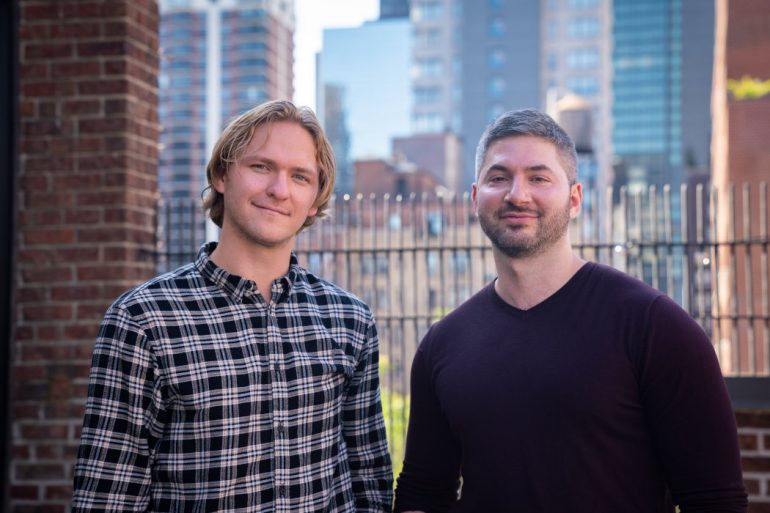New York and Montréal-based Bloom has raised $1.4 million CAD ($1.1 million USD) in seed funding to fuel the launch of its artificial intelligence (AI)-powered platform that measures the performance of product imagery for e-commerce brands.
Bloom’s initial focus was on helping e-commerce brands build photorealistic fashion models using generative AI. But after talking to a ton of e-commerce merchants, Bloom co-founders Aarlo Stone Fish (CEO) and Sam Dundas (COO) realized that none of the retailers they consulted knew which product photos were converting to sales, so the pair set out to solve this problem.
“When you pair that engine of optimized images with a system that can imagine new product photos, we see that as this really cool intersection.”
-Sam Dundas, Bloom co-founder and COO
Now, backed by Montréal’s Inovia and San Francisco-based AIX Ventures, Bloom has officially rolled out a platform designed to address this issue. But the startup has a larger vision that stretches beyond just measuring product photo conversion: Bloom’s big picture goal involves using this engine and generative AI to help create product images.
“A big reason for the raise was [that] we thought there was nothing cooler than to combine this performance engine with generative AI,” Dundas told BetaKit in an interview. “The biggest metric for us was like, can we get to our vision faster, and obviously having the capital and the right people on board helps.”
Bloom’s software platform optimizes product photography for e-commerce brands to help drive increased conversion and sales. The company’s software plugs into Shopify, and measures and shows product shots to customers that are most likely to drive them to buy a particular offering. Bloom aims to give brands a better sense of which product photos customers skip by quickly and zoom in on, and how particular pictures impact conversion with certain users.
Stone Fish is a Yale computer science grad and software engineer with a past experience working in adtech and AI, while Dundas is the former head of supply and senior director of partnerships at Montréal-based event planning startup Planned. The pair teamed up in early 2021 after meeting through AngelList.
Bloom’s December seed financing was raised via a simple agreement for future equity (SAFE). The round saw participation from Inovia and AIX Ventures, a new AI-focused investment firm led by AI startup founders Richard Socher of MetaMind and Pieter Abeel of Covariant, Stanford AI Lab Director Chris Manning, and Kaggle founder Anthony Goldbloom. Bloom’s round also included follow-on support from San Francisco’s Forum Ventures. The new capital brings Bloom’s total funding to about $1.7 million CAD ($1.3 million USD).
Forum Ventures CEO and Managing Partner Michael Cardamome said the firm thinks “it’s inevitable that high performing e-commerce brands will leverage generative AI to create site images and optimize conversion.”
“We spoke to over 200 e-commerce brands over the course of eight months and just asked them if they had any metrics on the photos on their websites, and the resounding answer was no,” said Dundas.
According to Dundas, while there are a lot of enterprise-grade website optimization tools on the market, many use A/B testing, which requires “a lot of integration” on the part of merchants to set up.
“Whereas Bloom, it’s just automatic,” said Dundas. “It works well with any other optimization app that [merchants are] using because all [Bloom] does is change around who sees what image.”
Within the e-commerce optimization space, Dundas said other available tools measure conversion based on pricing, layout, and other areas of brand websites. “We haven’t seen anything focusing specifically on product photos,” he said.
Bloom views Shopify as “a really good” go-to-market avenue, and plans to focus its efforts on serving Shopify merchants over the next 18 months. Longer term, the startup wants to expand beyond Shopify to brands using other platforms like Wix and WooCommerce.
For now, Bloom is targeting brands doing over $1 million in sales annually. As its algorithm becomes stronger, Dundas said it will also be able to help smaller-volume merchants.
Stone Fish and Dundas are currently Bloom’s only full-time employees. To date, their efforts have been focused on launching Bloom. But now that the startup’s platform is live, they’re looking to add some AI talent to help develop its algorithm, and bring on some sales support staff.
“We loved the team’s technical expertise and hustle getting their initial product into market,” said Inovia Associate Alysaa Co, who added that Inovia sees Bloom as “a great fit” within its broader future of retail thesis.
RELATED: Hootsuite nabs conversational AI startup Heyday in $60 million deal to further social commerce push
But Bloom’s ambitions are bigger than just measuring the effectiveness of certain product photos. Stone Fish told BetaKit that the startup sees a larger opportunity to pair its product picture conversion engine with optimized, AI-generated images.
“There is this new kind of AI called generative AI,” said Stone Fish. “What that means is AI that has imagination, so instead of just predicting something or making a recommendation about what kind of song you like … it would actually write the song.”
Companies like Google and OpenAI are using and researching generative AI for various purposes, while, to Stone Fish’s point, British pop-rock band Everything Everything even used this type of AI to help write its latest album.
“The fact that AI has an imagination is really just remarkable,” said Dundas. “But what we like to say is that the imagination lacks direction.”
According to Dundas, “what it’s missing is a coach to tell it what to actually generate.”
“We see that coach as being our algorithm, [which] figures out which photos actually convert best,” said Dundas. “When you pair that engine of optimized images with a system that can imagine new product photos, we see that as this really cool intersection.”
Feature image courtesy Bloom.

